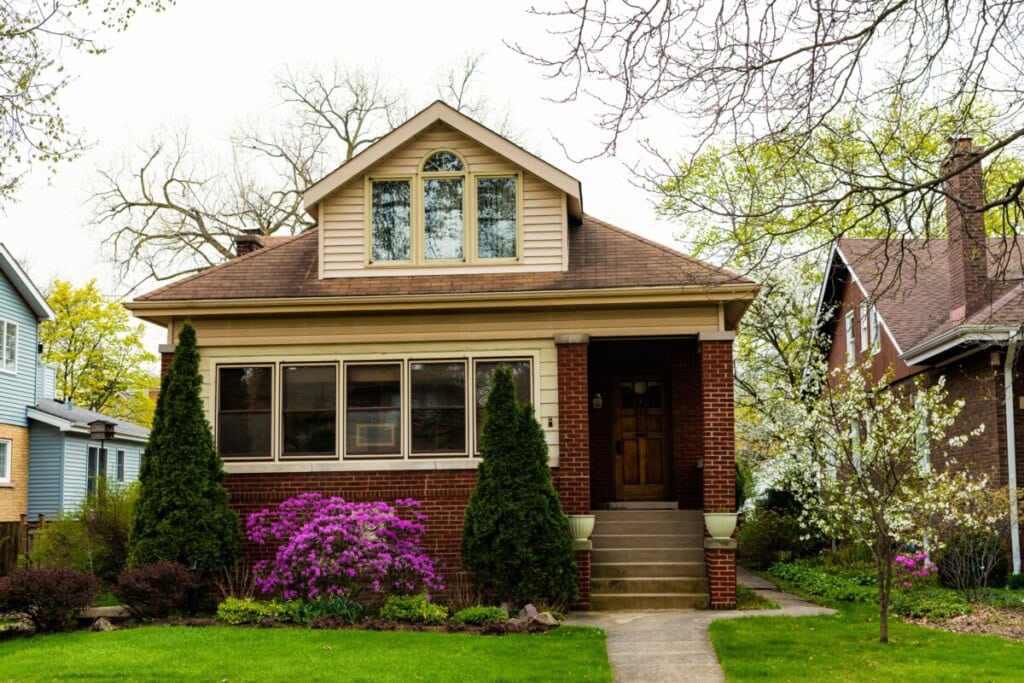Originally published HERE on April 9, 2025 by Jeremy Steckler
As we grow older, our needs and capabilities change, and not all homes are designed to support this change along with us. It’s common to upsize your home when your household is growing – whether to accommodate children, pets, or simply because you need an extra room for a home office. But what once was the perfect home, may now be too hard to manage and maintain in your golden years.
There are countless benefits of downsizing your home, and it’s a wonderful way to open the door to the next stage of your life. But, making the decision to downsize can be hard, and leaving a home filled with cherished memories can bring heartache. So, when is the right time to downsize? If owning your home in Seattle, WA or renting a house in Portland, OR has brought more stress and worry than it has joy and comfort in recent years, the time may be now to downsize into something smaller – or maybe even renting a space like an apartment in Beaverton, OR. Here are 14 signs it’s time to put your house on the market and downsize.
Signs it’s time to downsize
Your monthly housing expenses have exceeded 30%
You have little left over once bills are paid
Maintaining your home is becoming difficult
Managing your home feels more stressful than satisfying
Your home has features that make aging in place difficult
Your neighborhood no longer fits your lifestyle
You want to turn home equity into retirement income
You have the option to live anywhere
Consider downsizing your home when several rooms go unused
You’re ready for a change of pace
Your storage spaces are overflowing
The kids have left and you don’t need the space
Downsizing has been on your mind for a while
You’re craving a simplified life
What next?
Types of housing options for downsizing your home
What to do now?
In conclusion: do what’s right for you

1. Your monthly housing expenses have exceeded 30%
A general rule of thumb is to spend around 30% of your monthly budget on housing expenses. This includes your mortgage payment, utilities, maintenance costs, homeowners insurance, and property taxes. In fact, any household that spends above 30% is considered financially burdened. Stressing over finances can have an impact on your mental, emotional, and physical health, and having a little extra money saved up will help you be prepared in case any unplanned expenses or health issues arise.
Downsizing your home is a great way to lower monthly housing expenses because typically, a smaller home means smaller monthly housing expenses. Before you begin the home buying and selling process, be sure to calculate how much house you can afford on a fixed income.
2. You have little left over once bills are paid
The definition of retirement has changed drastically over the years. Now more than ever before, retirees are maintaining an active lifestyle that includes hobbies, exercise, and continued learning – and these all cost a bit of money. “Downsizing can significantly lower your monthly housing costs, including mortgage payments and utility bills, freeing up more funds to save or invest in services like professional home cleaning,” says Brian Vargas, Chief Growth Officer of Clean Home Theory, a home cleaning service in Maryland and Virginia.
So, how would you like to spend your time? Perhaps it’s joining a gym, taking painting classes, or taking a few college courses. If your monthly housing expenses are so high that you can’t enjoy your hobbies or activities, now may be the perfect time to downsize to free up some cash so you can spend it the way you want.
3. Maintaining your home is becoming difficult
Our homes are filled with precious memories that we hold dear. The wall where you recorded your grandchildren’s heights, to the living room where your daughter first learned the piano. Our homes are reminders of the love and laughter we’ve shared with friends and family, and this leads many to remain in their homes longer than is wise for their health and financial stability.
Limited mobility can prevent you from being able to perform general maintenance around the house, like yard work and regular cleaning. No matter your age, there will always be household chores that need to be done. But cleaning the gutters, vacuuming a two-story home, or mowing the lawn and trimming the shrubs can become more difficult as you get older. “I work for a lot of elderly clients and their homes sometimes become too big to keep up with anymore,” says Sara San Angelo, Founder, Confessions of a Cleaning Lady, a home cleaning blog with tips from a professional housekeeper.
In her words, “It’s time to downsize when you’re unable to keep up with all the cleaning chores of a large home, such as mopping and vacuuming large swaths of floors, cleaning large walk-in showers, or dusting high places. Large homes can sometimes become safety issues for the elderly, especially if you have stairs and multiple levels.”
If you’ve reached the stage where these tasks seem impossible, it’s time to go smaller. “When both parties agree based on several conversations and when maintaining the home becomes a burden physically and financially, it’s time to downsize,” says Shelley Lazear, LCSW, of The 3rd Half Retirement Coaching, a coaching service for retiring seniors.
It’s better to make this decision sooner, rather than later. If household chores begin to pile up and if they impact the condition of your home, you may see a decrease in property value when it comes time to sell.
4. Managing your home feels more stressful than satisfying
Despite the challenges of home ownership, there should be some joy in taking care of your space. “A clear sign it may be time to downsize is when managing your current home leaves you more stressed than satisfied,” says Kara Charyga, owner and professional organizer with Gone Home Organizers, a home organizer service based in Las Vegas. “If your space no longer supports your lifestyle and requires constant upkeep, scaling down can bring huge peace of mind.”
In fact, keeping in mind the lifestyle you want can help with making these challenging decisions. “The real sign it’s time to downsize isn’t just about square footage or finances — it’s about freedom,” says Randy Ahmad, a Tampa real estate agent with Home Selling with Randy. “When you find yourself spending more time managing your house than living your life, that’s your cue. You want less of ‘mowing the lawn’ and more of ‘where am I going or what am I doing next?’ Your home should serve your lifestyle, not the other way around.”
For Beau Correll, founder of Fetch Agent, the functionality of your home should adapt to and match your lifestyle. “A clear indicator that it may be time to downsize is when maintaining your home becomes more of a burden than a comfort,” says Beau. “For some, that means ongoing financial costs or maintenance in unused spaces. For others, it’s the physical strain from upkeep or climbing the stairs.”
5. Your home has features that make aging in place difficult
If you’ve gained mobility restrictions as you’ve grown older, you probably made home improvements and modifications for safe and comfortable living. You’ve installed handrails, upgraded the lighting, and replaced your hard flooring with carpet. But depending on your layout, there may be some home features you’re unable to modify that still pose a threat to your safety and make aging in place difficult. Features like several flights of stairs, narrow doorways, or high-maintenance landscaping can all be safety hazards. If these home features have become obstacles for you, then now is the right time to downsize to a safer floor plan. A home designed for optimal accessibility, convenience, and safety is imperative to avoid falls and serious injuries. Listen to this general rule for Susan Schneider of Anhinga Coaching LLC, a coaching service for supervisors. “The right time to downsize is when there are too many steps from the laundry to the kitchen,” she says.
When considering downsizing your home, it’s also important to consider the weather in your area as snow and ice can be dangerous for someone at any age.
6. Your neighborhood no longer fits your lifestyle
If you’ve lived in your current home for countless years, you probably opted for a neighborhood that suited your lifestyle then. Maybe you chose a suburban neighborhood to escape city life. Or maybe you moved into a townhouse in the bustling city for an easier commute to work. These neighborhoods may have been ideal for your previous situation, but now they may no longer fit your needs.
You may find downsizing to a different neighborhood is what you need to fit your current lifestyle. Downsizing your home to a smaller one can reduce the amount of upkeep and free up your time for leisure activities, getting more rest, and spending time with family and friends.

7 You want to turn home equity into retirement income
For most homeowners, equity is one of the most valuable assets, but sometimes your home may be too expensive to maintain. If your plan is to rely on home equity for income in retirement years, such as using a reverse mortgage, now may be the right time to downsize.
“When you start noticing that a huge chunk of your life’s savings is stuck in your home’s equity like 50% to 70% of your total net worth (bonus if your mortgage is paid off), and you’re daydreaming about traveling more, boosting your retirement fund, or maybe helping the kids out – it might be the perfect moment to consider downsizing,” says Wil Thomas of Seniors Bulletin Canada, a review service for seniors and caregivers in Canada. “Sometimes, turning that extra square footage into financial freedom just makes more sense, especially if it lets you enjoy the things you truly care about.”
Property taxes and maintenance costs may even be lower after downsizing. Work with a real estate agent so you can sell your current home for the most money possible.
8. You have the option to live anywhere
The beauty of retirement is that you’re no longer tied to one location and can choose to live wherever your heart desires. This gives you the opportunity to look all across the US housing market for neighborhoods with the lowest property taxes, utilities, sales taxes, and more. So, if you’re wanting to sell your home in Vancouver, BC, and escape to sunny Sacramento, CA, or if you’re looking to be closer to family, the world is now your oyster.
9. Consider downsizing your home when several rooms go unused
It may feel like just yesterday when three bathrooms didn’t feel like enough, or when your grandchildren’s toys somehow managed to take over the entire house. At those times, you probably longed for a larger house to control the chaos. But, if any of the rooms that were once used are now rarely opened, it doesn’t make sense to pay to heat, cool, and light them. Saving money on utilities and property taxes are just a couple more reasons to think about downsizing your home.
Julia Hill-Silva of All City House Cleaning Services, a cleaning service and more in King, Pierce, and Thurston Counties in Washington state, adds that downsizing can offer emotional relief when it comes to an abundance of rooms. “One sign it’s time to downsize is when you’re only using a fraction of your home — like finding yourself closing off rooms you no longer need or use,” says Julia. “If your space starts to feel more like a burden than a benefit, downsizing can bring both emotional relief and financial freedom.”
You may think you’re using all the rooms in your home, but it’s important to note if they’re being used for a purpose or just used as storage. “It may be time to downsize when the ‘stuff’ starts taking up more space — physically and mentally — than the people living in the home,” says Leah Ruth Forbert, Owner and Lead Organizer of LRO Home, a home organizing service based in Austin, Texas. “If you find that certain rooms are rarely used or are primarily functioning as storage, that’s a strong signal that your home may no longer align with your current lifestyle. A smaller, more intentional space can create clarity, ease, and a greater sense of peace.”
10. You’re ready for a change of pace
Maybe you’re starting to dream of travel or other enriching life experiences – that might be a sign that it’s time to downsize. “There are many reasons my clients downsize – from aging out of their homes, to becoming empty-nesters, to wanting a change of scenery,” says Cori Jacob of Perfectly Placed, a decluttering, organizing, and move management service in Portland, OR. “One of the most fun reasons, however, is a change in lifestyle. A few recent clients downsized for flexibility, decreasing their material possessions and housing expenses to allocate more time and money towards life experiences, such as travel. Downsizing into a smaller living space provides extra spending capacity to enjoy all that life has to offer!”
11. Your storage spaces are overflowing
Part of downsizing is learning to let go of material possessions that aren’t serving you anymore. As hard as this process can be, it can also offer immense relief and calm. “One clear sign it’s time to downsize is when your storage spaces are overflowing — not because you need more room, but because you’re holding onto things you no longer use or need,” says Amber Carey of Amber Home Organizing, a professional organizer based in Bozeman, Montana, with virtual services available nationwide. “If you’re organizing around excess instead of living with intention, it may be time to simplify your space and lifestyle.”
If there are some personal things like clothes or jewelry that you want more time to comb through, it’s okay to get a storage unit so you can go through things at your own pace. “When you’re downsizing, storage units offer a flexible way to keep seasonal or rarely used items without cluttering your new, smaller space,” says Hunter Jones, owner of Creekside Storage, a storage facility in East Tennessee. “Downsizing can be tough when it comes to sentimental belongings. A storage unit gives you time and space to decide what stays without rushing the process.”

12. The kids have left and you don’t need the space
Most homeowners start to think about downsizing after their kids leave home. “Have your kids finally flown the coop? Becoming an empty nester presents a prime opportunity to downsize,” says Rebecca Haumann, professional organizer with In Harmony Organizing, a home organizer company in Portland, Oregon. “It’s important to go through all of your belongings and declutter as much as possible before relocating to a smaller home with fewer bedrooms.”
13. Downsizing has been on your mind for a while
This one may sound simple, but if you’ve been floating the idea of downsizing back and forth with your partner for a few years, it might be time. “There is no wrong time to live with less,” says Missy Weimer of Life Hack Organizing, a professional organizing service in the Chicagoland Area. “Today’s trend-turned-lifestyle movements of tiny homes and ‘van-life’ are examples of people’s growing desire to downsize. With an eye toward sustainability and quality over quantity, more and more people are discovering the joys of less. And many of us have discovered the pain of too much, perhaps after a loved one passed.
Whether or not you’ve picked up on it, downsizing may be on your mind subconsciously. “When you start accumulating piles in rooms where they don’t belong — like unopened mail on your dresser, donation bags in the guest room, or old electronics in the hallway — it’s often a sign of postponed decisions,” says Talia Rosenthal, Co-Founder of Sorted, a home organizing service with organizers across the country. “If these items are lingering simply because you have the space, it might be time to downsize and create a home that encourages clarity and intentional living.
14. You’re craving a simplified life
Living a simpler life may offer some helpful benefits to your emotional and mental health. “It’s time to downsize when your personal possessions and material goods are weighing you down and preventing you from making room for your new retirement lifestyle,” says Patricia Cavanaugh of The 3rd Act, a retirement planning service for seniors.
For Dr. Karen Midyet, Psy.D. of Coaching Aging Adults, an older-adult focused, integrative practice to help seniors with the next phase of life, many of her clients crave a simpler life to make things easier on their kids. “Some of them have had to downsize and declutter their own parent’s homes in the past, and they tell me they don’t want their kids to have to do what they had to,” says Dr. Midyet.

Types of housing options for downsizing your home
So, if you’ve decided that now is the right time to downsize, it’s important to consider a number of factors while choosing between housing options. Mobility and ability restrictions, caregiving needs, location, and budget all play a large role. When you’re downsizing your home, it’s important to find a place that meets both your current needs as well as your future ones. Here are four main housing options to consider when downsizing your home.
- Buy or rent a single-family house or one-story condo. With home modifications applied as necessary, like bathroom grab bars or adding anti-slip mats throughout the home, you’ll be able to live independently for longer. If you’re still relatively independent or can get the level of help you need, perhaps meal delivery, cleaning services, or with the help of an in-home caregiver, staying at home can be a good option.
- Move in with a loved one. Being close to children and grandchildren not only creates a stronger bond with them, but it can also give you peace of mind in case any health concerns come up. Want more alone time? Consider adding a tiny home to the backyard.
- Move into an independent living community. This includes senior housing, retirement communities, senior apartments, and active adult communities. The homes can be single-family houses, townhouses, apartments, or condos. They typically provide meal prep, transportation, housekeeping or maintenance, and health-related services. The community will often have recreational centers or clubhouses to give you the opportunity to connect with others and participate in community activities. You’re surrounded by people of similar age and interests and can enjoy the amenities and activities together. Since independent living facilities are aimed at older adults who need little or no assistance with activities of daily living, most do not offer medical care or nursing staff. You can, however, hire in-home help separately as needed.
- Move into an assisted living community. This is typically for seniors who can live somewhat independently, but require assistance for some daily tasks. Typically, the staff is available 24 hours a day, and meal prep, medication management, bathing, dressing, housekeeping, and transportation are all available. They also offer social groups and recreational activities.
In-home care services are also offered at various levels depending on the situation. In-home caregivers can provide help with day-to-day activities like cooking, grooming, or shopping, while also making sure you’re safe.
It’s important to note that the list above is not an exhaustive list of options. For some, downsizing offers the opportunity to embark on more extreme adventures. “For me, downsizing meant going from a big house to a small sailboat,” says Larry Jacobson, an award-winning author, speaker, coach, and adventurer. “I then spent the next six years sailing around the world and became used to having a closet the size of a shoebox. I now live in a one-bedroom condo and find it perfectly big enough.”
What to do now?
So, now that you’ve learned about some signs that now might be the right time to downsize and looked into a few types of housing options, what are the next things to consider?
Consider renting out your house
A nice way to ease into downsizing without selling your house is to consider renting it out. “If your monthly payments are low enough to cover a cozy new home, with a little extra income from renting out your current place, it could be the perfect opportunity to downsize into a more manageable place,” says Kassandra, a field manager and local home expert at Marvel Home Services, a home cleaning service. “In today’s economy, that extra cash flow can make a big difference, especially as some of our clients choose to ease into retirement and want to cut down on cleaning and other maintenance costs.”
Mark Lister, a property manager with The Rental Lister, a Las Vegas property management company, sums this idea up pretty well. “When your current house rents for a lot more than the mortgage, it’s time to downsize,” he says.
Write out what’s causing the most stress
Ellen Goodwin, Co-Founder and CSO of Artifcts, a digital service for keeping track of possessions and keepsakes, has a technique for deciding if downsizing will offer you some relief. “Make a list of the things in your life causing you the most stress, things that are within your control,” says Ellen.
“You may discover downsizing could be liberating for your budget as well as your time. Less time on maintenance, more time with friends and family, enjoying hobbies, and traveling. You may even feel relief as you shift yourself and your family toward new traditions. Invite the next generation to host the next family gathering with you there to make sure they remember the ‘must-have’ dishes and desserts.”
Give yourself a deadline
If this has been on your mind for a while, consider putting a date on the calendar to finalize your decision. “When is the right time for anything?” says Karen J. Carr, a retirement coach with Revitalize Coaching. “If you sense that you want to and are ready to make a change – decide when to decide.”
Karen continues, “The minute you put a date on the calendar more planning will come into focus. For example, if you’d like to move into the city from a suburb, the moment you start doing specific research, choose a deadline for yourself. If the deadline comes and goes and you aren’t more clear on this move, it may be time to shift gears to an even more specific location and put a new, realistic date on your calendar. If you are talking to friends and family about your timeframe, and your desires, that might help. Ideally – working with a retirement coach can help you make these decisions based on your values and lifestyle goals.”
In conclusion: do what’s right for you
There are many factors to take into account when answering the question – when is the right time to downsize? But the decision ultimately lies with you. Keep in mind these 14 signs as well as the next steps to explore as you come to a decision that moves you into the next stage of your life with ease.




